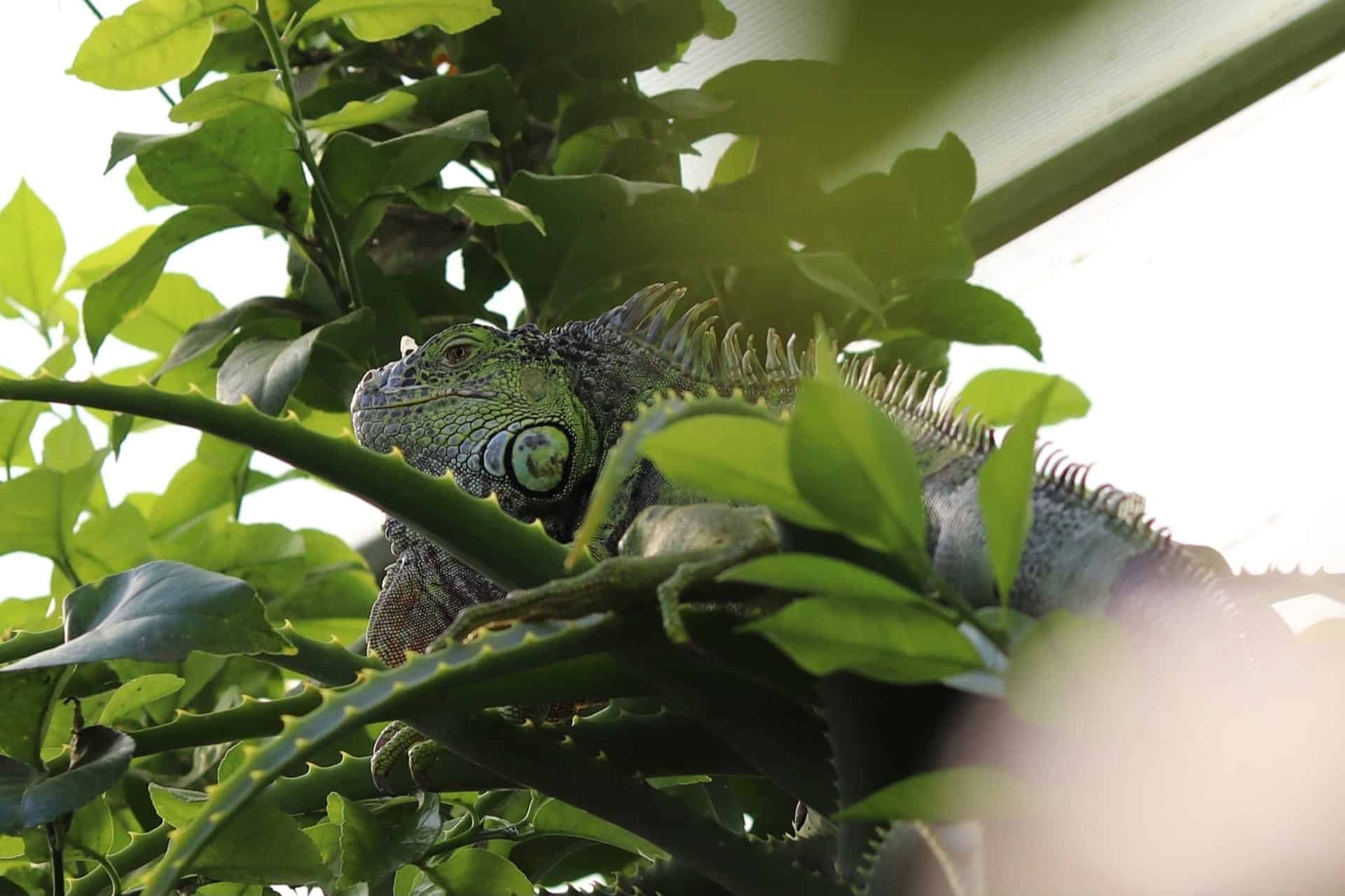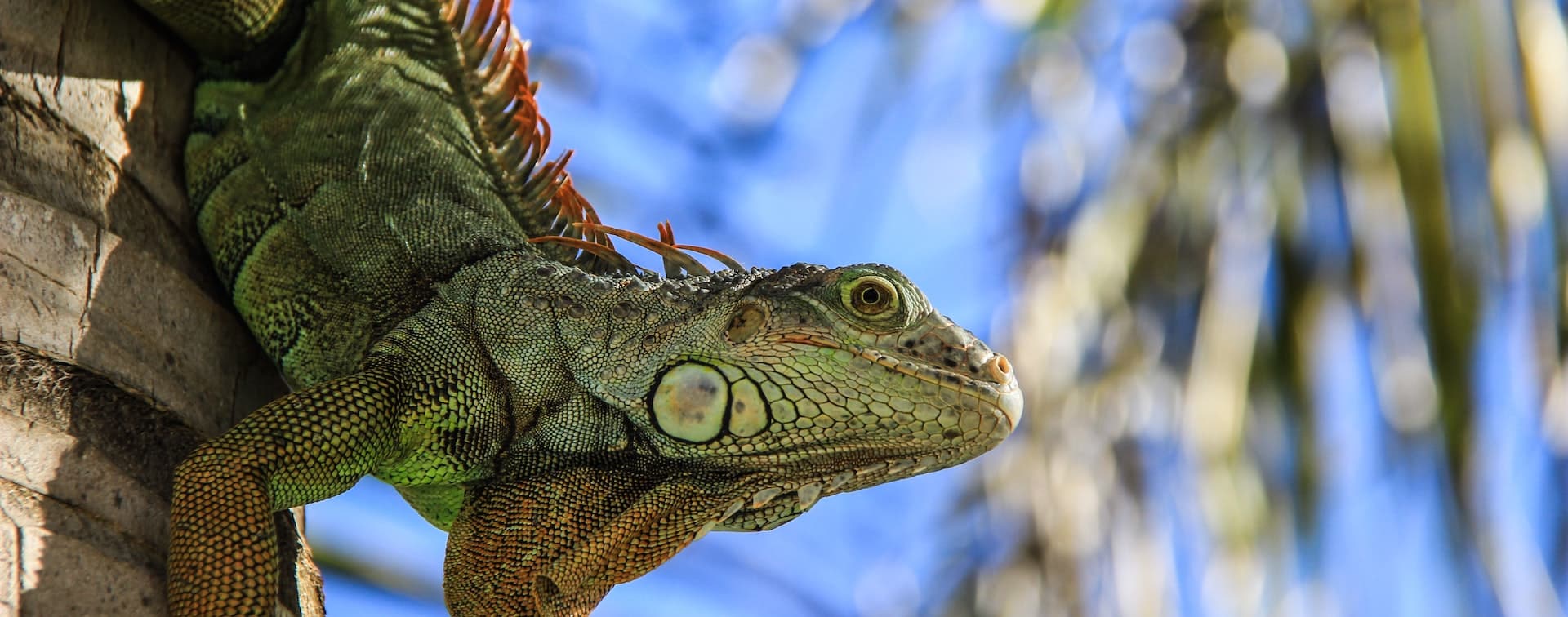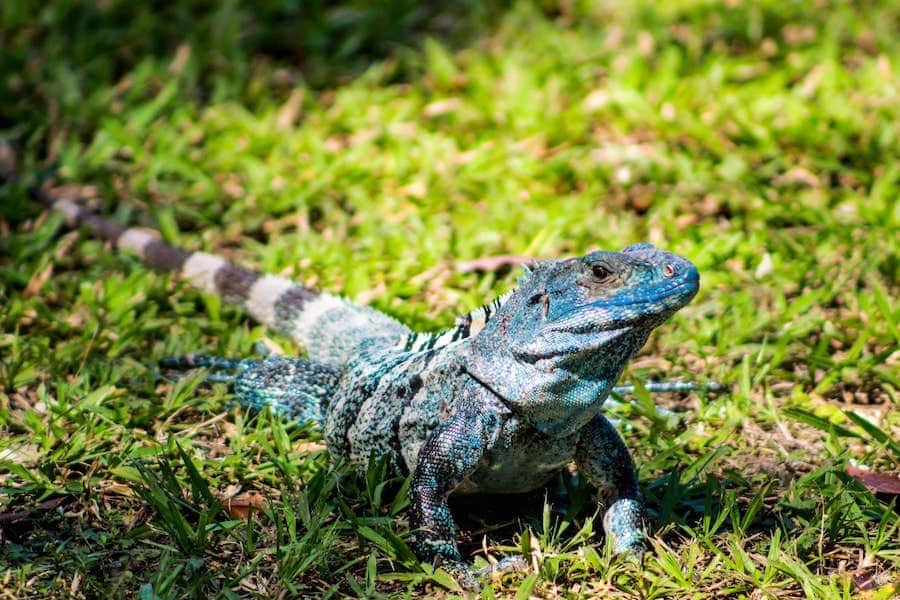The Most Common Types of Iguanas
Iguanas are a reptile species that belong to the family Iguanidae. The best-known species of iguana is the green iguana, also known as the common iguana. Males of this species can reach a maximum length of over two meters.
Male common iguanas are typically green with dark bands that form rings on their tails, while females are grayish green and about half the weight of males. They are most often seen basking in the sun on tree branches overhanging water.
The Invasive Species of Floridian Iguanas
Iguanas are primarily found in South America and the Caribbean as wild animals, but they first appeared in Florida in the 1960s – either by hiding in cargo shipments or being introduced by exotic pet sellers.
Over the years, non-native iguanas began multiplying rapidly in parts of Florida, leading to a need for iguana control and removal. Though green iguanas are not considered an endangered species, their invasive nature and wide-spread trade has led to their regulation in many places. And while iguanas are known for their striking appearance and docile nature, you may still be wondering if these reptiles are dangerous.
Iguana Bites: A Cause for Concern
One of the primary reasons people wonder if iguanas are dangerous is due to iguana bites. While the average iguana is harmless to humans, they have sharp teeth that can cause significant damage.
The teeth of green iguanas are serrated and can cause deep bite wounds. Iguana teeth may look intimidating at first, but iguanas rarely bite unless they are provoked. They are born with fully formed teeth in four equal quadrants.
Each quadrant has between 20 and 30 teeth that are constantly growing, being worn down, and being replaced by new teeth. In total, iguanas have somewhere between 80 and 120 teeth at a time, all of which are diamond-shaped, small, translucent, and sharp.
Because iguanas possess dozens of sharp, serrated teeth, their bites can produce serious injuries to the face, wrist, fingers, and ankles. The best way to avoid an iguana bite is to know the warning signs of an agitated iguana. This is when knowing about an iguana’s body language comes in handy.
Some warning signs of an impending iguana strike include:
- Standing on all four legs
- Drawing in a deep breath
- Making its body appear larger
- Lowering of the iguana’s dewlap (its skin flap beneath its chin)
Male iguanas can become aggressive during breeding season, and it’s during this time that they are most likely to bite humans or other animals. These iguanas are territorial during this time of the year, which takes place at the end of the summer. It is best to steer clear of iguanas during this season to avoid provoking a male iguana in any way.
Iguanas do have venom glands. While an iguana bite may not be venomous, it can still lead to severe injury and require medical attention. Treatment could be as simple as a bandage and some antibacterial ointment. But it’s always best to consult a medical professional.

It’s Not Just Their Teeth: Once Provoked, Iguanas Can Do Damage
An iguana’s teeth may be sharp, but they’re more often used to tear into plants rather than to attack humans or other animals. However, once provoked, an iguana can do damage.
Iguanas can do significant damage to unsuspecting animals and humans alike using their strong jaw bones and long tails. These reptiles use their tails as defense mechanisms against predators, and they’ve been known to strike humans if threatened.
Iguanas also have sharp claws, which can also be used for self-defense. While it’s unlikely that their scratches can be lethal, they can certainly cause infections if not treated quickly. So, while an iguana attack may not be deadly, it is best to stay away.
Health Problems When Iguanas Bite
Another reason that iguanas may be considered dangerous is that they can carry salmonella bacteria, which can cause health problems in humans. This is especially true for reptile collectors or people who purchase iguanas from pet stores.
It’s important to take proper precautions when handling iguanas or the things they’ve touched, such as washing your hands frequently and cleaning surfaces with soapy water to prevent the spread of bacteria.
If an iguana is carrying any kind of bacteria that it may have come into contact with, a bite can go from painful to dangerous. This is because if an iguana bite breaks skin, the bacteria can be transferred directly into the wound.
Iguanas are also pleurodont, meaning that they commonly shed their teeth when they bite, leaving their tiny teeth behind. If the bite breaks the skin, the teeth they leave behind can become embedded within the wound and cause even more serious bacterial infections. After any animal bite, it’s best to seek medical attention.
Iguanas and Their Body Language
At the end of the day, iguana bites and attacks are quite rare. They aren’t naturally aggressive toward humans or other animals unless they are stressed out or provoked.
In fact, iguanas are not commonly interested in large prey due to the fact that they are herbivores. Because of this, they avoid interacting with humans or other large animals that can pose a threat to them.
One way to determine whether an iguana may be dangerous or aggressive is to pay attention to its body language. Iguanas tend to communicate through their body language, and understanding the warning signs can help prevent bodily harm.
Signs of aggression or danger may include:
- Puffing up their body
- Hissing
- Flicking their tail
- Rapid head bobbing
- Defensive tail whipping
Despite their potentially dangerous nature, iguanas are generally harmless to humans when they are not provoked. Most iguanas typically tend to be peaceful creatures and are not likely to cause significant harm, which is why iguanas are often kept as common pets due to their unique appearance and docile nature.
Iguanas Are a Danger to the Environment
Iguanas are herbivores, which means that an iguana’s diet primarily consists of plants and vegetation. They tend to enjoy fruits, vegetables, and leafy greens and may also consume flowers or insects.
While iguanas are typically docile creatures, it’s not just harm to people and animals that you have to worry about. They can be dangerous to your garden and landscape when they infest properties. While this might not put your safety at risk directly, it can certainly put a strain on your wallet.
Green iguanas can also cause damage to infrastructures by digging burrows that collapse and erode sidewalks, foundations, berms, canal banks, and seawalls. They can also leave droppings on docks, porches, decks, pool platforms, moored boats, and inside swimming pools. These destructive behaviors may not directly pose a threat to humans, but the indirect threat is quite high.
Iguanas love water, so they can easily utilize your seawall, dock, or other structures to gain access to your property. Topography protection is a great way to take care of your property. From iguana nest removal, product application including iguana repellent, iguana trapping, and an iguana monitoring, topography protection is the best approach to reduce iguana infestations.
Iguana monitoring services focus on getting rid of burrows and holes, strategically placing traps with pieces of fruit or flowers, and thoroughly assessing and maintaining your property. Because iguanas can cause damage to your roof or the structure of your house if they are able to climb up there, it’s important to remove any branches allowing iguanas to access your home.

Contact a Professional When Dealing with Iguanas
When considering whether or not iguanas are dangerous, the answer isn’t as simple as yes or no. While iguanas may be potentially dangerous or aggressive if they feel threatened, they are generally harmless to humans and other animals.
Iguanas are commonly known to be peaceful creatures, and most bites or injuries caused by iguanas can be prevented by paying attention to their body language. It is easy to prevent yourself from being bitten by an iguana by avoiding them if you encounter them in the wild.
If you are in a situation where you must handle an iguana, follow the following steps: Approach the iguana very slowly from the side so that they do not get overwhelmed by your shadow. Fully and completely support the iguana’s body and tail with one arm underneath its belly while your other arm is used to restrain it.
Keep in mind, it is illegal to relocate iguanas in the state of Florida – and there are laws that also regulate their ownership. If you are attempting to remove one from your property, also know that there are state and federal laws against animal cruelty that you must follow. If you are unsure how to handle an iguana infestation on your property, contact Iguana Control.


